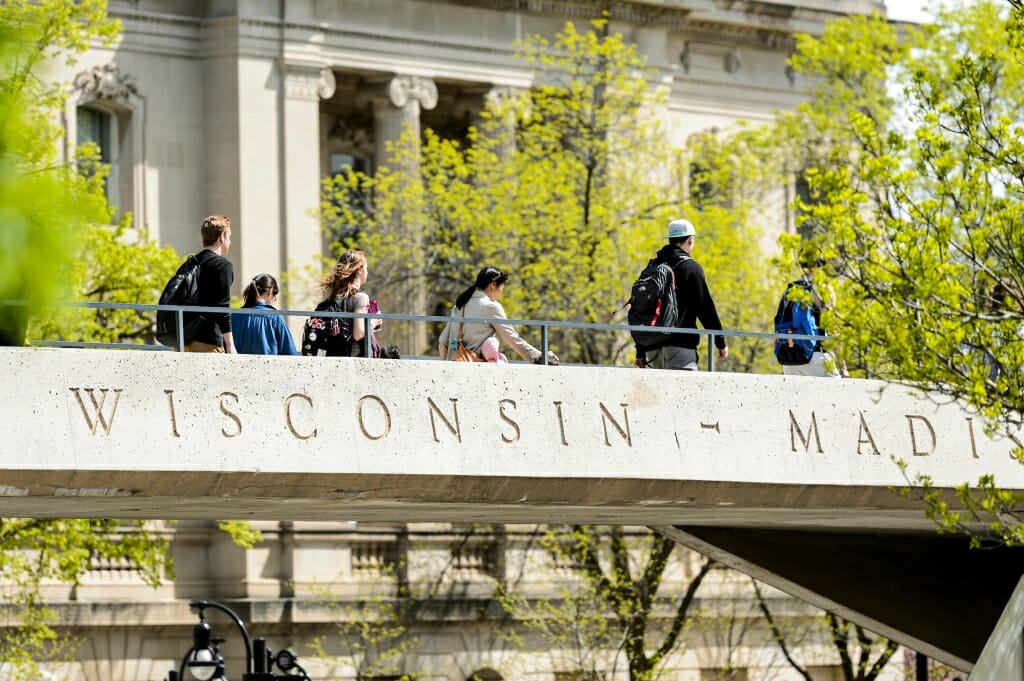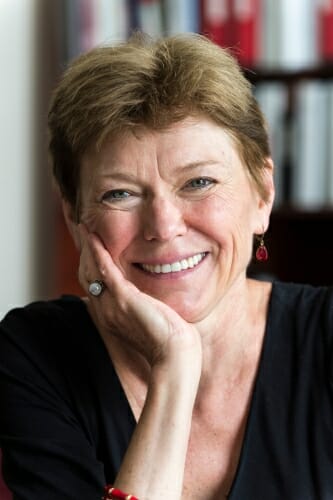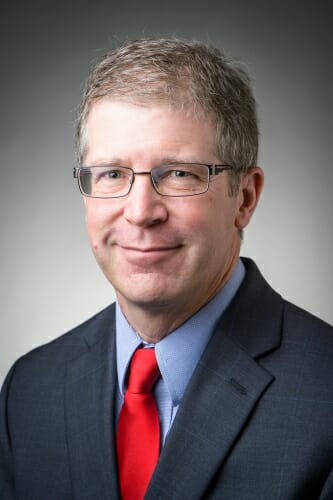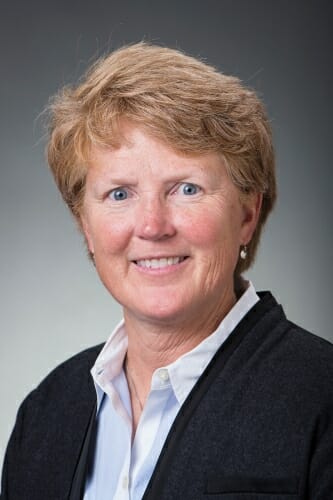Students give UW high marks for encouraging critical thinking, leadership

Students walk across the North Park Street pedestrian overpass bridge that links Bascom Hill and the Mosse Humanities Building. Photo: Jeff Miller
UW–Madison seniors gave the university high marks in a recent survey, with 91 percent saying they would attend UW–Madison again, compared to 85 percent of seniors at peer institutions.
The National Survey of Student Engagement administered in spring 2017 also shows UW–Madison students gave high scores in the four areas of growth laid out in the Wisconsin Experience — the university’s vision for the total student experience in and out of the classroom.
“We’re pleased that our students feel they are getting a strong education and a variety of meaningful experiences on campus,” Provost Sarah Mangelsdorf says. “This survey is one important measure of how we’re doing relative to peer institutions.”
NSSE surveys college freshmen and seniors to assess aspects of student learning, what students think of their undergraduate experience, and how they are benefiting from their studies. It was last conducted at UW–Madison in 2014.
The four areas of the Wisconsin Experience, and the pertinent NSSE scores, are:
- Intellectual confidence: 82 percent of freshmen and 90 percent of seniors agreed that UW–Madison helped them develop skills for thinking critically and analytically, compared to 77 percent and 84 percent, respectively, at peer institutions.
- Empathy and humility: 75 percent of seniors often or very often learned something that changed the way they understand an issue, compared to 67 percent at peer institutions.
- Relentless curiosity: 66 percent of seniors were more likely to often or very often contribute to class discussion, compared to 60 percent at peer institutions.
- Purposeful action: UW–Madison seniors were more likely than peers to hold a formal leadership role in a student organization, to work with faculty members on research projects and to connect learning to societal problems.
“The NSSE results show that the majority of our students are indeed achieving their Wisconsin Experience with engaged classroom learning combined with meaningful co-curricular experiences,” says Steven Cramer, vice provost for teaching and learning.
The UW–Madison education is built on rigorous academics, the survey showed. Overall, 89 percent of freshmen and 87 percent of seniors said the university emphasizes spending time on academic work, compared to 82 percent and 82 percent at peer institutions. And 92 percent of seniors rated the academic quality of UW–Madison as good or excellent, significantly higher than the peer average of 86 percent.
“A strong academic education across a wide variety of disciplines is the heart of what we offer at UW–Madison,” Mangelsdorf says.
UW seniors reported spending more time on assigned reading but less time writing than peers in the survey.
UW–Madison seniors surveyed were more likely than peers to participate in what NSSE calls “high-impact practices” because of their positive association with student learning and retention. Those practices are learning community, a formal program where groups of students take two or more classes together; service learning; research with faculty; internship; study abroad; and culminating senior experience, such as a senior thesis.
Seniors and first-year students also reported higher levels of reflective and integrative learning, such as connecting ideas from their courses to prior experiences and knowledge, compared to peers.
“Students at UW–Madison are encouraged to synthesize all of what they learn — in the classroom and outside of it — for an overall learning experience. We encourage students to create their own, unique Wisconsin Experience,” Interim Vice Chancellor for Student Affairs and Dean of Students Lori Berquam says.
The survey also explores issues of diversity and inclusion, asking students how frequently they engage in discussion with people whose backgrounds are different than their own. UW–Madison seniors reported less frequent discussions than seniors at peer institutions. First-year students, however, were more likely than their peers at other institutions to take part in such discussions often or very often.
The specific results were:
- Conversations with students of a different race: Seniors 64 percent; first-years 72 percent
- Conversations with students of a different economic background: Seniors 69 percent; first-years 78 percent
- Conversations with students of a different religion: Seniors 69 percent; first-years 77 percent
- Conversations with students of a different political background: Seniors 59 percent; first-years 72 percent
UW–Madison has made it a priority to make the campus community welcoming and inclusive of all through such initiatives as Our Wisconsin, which this year was made available to all first-year students in university housing.
“I’m encouraged by the growth we’re seeing among first-year students — it’s a sign our campus is making progress in creating an inclusive campus community where all students feel like they belong,” Berquam says.
In 2017, a total of 725 colleges and universities across the United States and Canada participated in the survey. NSSE is based at the Indiana University Center for Postsecondary Research. The UW–Madison response rate was 29 percent overall — 1,952 first-year students (31 percent) and 2,556 seniors (28 percent) participated.
Tags: provost, student life, students







